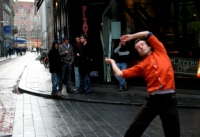DANCE CONGRESS 2013 IN DÜSSELDORF

© Annesofie Norn
The Dance Congress 2013 enjoyed overwhelming popularity. More than 1,000 dance professionals and people interested in dance participated in the four-day international Congress held on the premises of the tanzhaus nrw and the Capitol Theater. Over 5,000 spectators visited the accompanying dance programme at the various venues in Düsseldorf. The Dance Congress 2013 was organised, like its predecessors 2006 in Berlin and 2009 in Hamburg, by the German Federal Cultural Foundation.
In more than 100 events, 250 speakers from Africa, South America, India, Europe and the South Pacific gave thought-provoking impulses that were taken up and enlarged upon by the participants in discussions. Present at the Congress were theorists such as the philosopher Jean-Luc Nancy, the dance scholars Gabriele Brandstetter and Gabriele Klein, the performance theorist André Lepecki and a whole array of renowned choreographers including William Forsythe, Martin Schläpfer, Anne Teresa de Keersmaeker, Sidi Larbi Cherkaoui, Deborah Hay, Kôffi Kôko, Faustin Linyekula, and Jonathan Burrows. Questions related to passing on bodily knowledge, dramaturgical working methods or the critical reflection upon normative body images were discussed with the same intensity and passion as the enhancement of promotion structures and the visibility of dance as an art form in society.
The title, ‘Bewegungen übersetzen - Performing Translations’, referred to both the theme of the Congress and the methodological approach. For translation processes within and between different cultures were not only the topic of numerous lectures, talks and workshops. The theme of “transfer” also reflected the path of mutual approach among participants of different origin and with different specialisations. Of special significance for the success of the Congress was an intellectual and creative discussion culture that did not shy away from conflicts and the fact that it raised the awareness of the social position of dance as an art form: “How can a society undergoing radical change grow with its upheavals? Most likely only by learning to translate conflicts caused by contrary dynamics into positive developments.” (Helmut Ploebst, Der Standard)
The positive response to the Dance Congress 2013 once again confirmed how undiminished and great the need of the national and international dance scene is for expertly led exchange and critical debate on both the artistic and social level. In 2016 the German Federal Cultural Foundation will give this need a platform again in Hanover.
The Dance Congress 2013 was an event of the German Federal Cultural Foundation in collaboration with tanzhaus nrw. Cooperation partners: Capitol Theater Düsseldorf, Deutsche Oper am Rhein Düsseldorf Duisburg, Düsseldorfer Schauspielhaus, FFT Düsseldorf. With the support of Kulturamt der Landeshauptstadt Düsseldorf, Ministerium für Familie, Kinder, Jugend, Kultur und Sport des Landes Nordrhein-Westfalen, International Research Center “Interweaving Performance Cultures” – Freie Universität Berlin and Goethe-Institut.